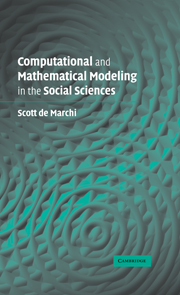Book contents
- Frontmatter
- Contents
- Acknowledgments
- Prelude
- 1 Not All Fun and Games: Challenges in Mathematical Modeling
- 2 Looking for Car Keys Without Any Street Lights
- 3 From Curses to Complexity: The Justification for Computational Modeling
- 4 Why Everything Should Look Like a Nail: Deriving Parsimonious Encodings for Complex Games
- 5 KKV Redux: Deriving and Testing Logical Implications
- 6 A Short Conclusion
- References
- Index
3 - From Curses to Complexity: The Justification for Computational Modeling
Published online by Cambridge University Press: 23 July 2009
- Frontmatter
- Contents
- Acknowledgments
- Prelude
- 1 Not All Fun and Games: Challenges in Mathematical Modeling
- 2 Looking for Car Keys Without Any Street Lights
- 3 From Curses to Complexity: The Justification for Computational Modeling
- 4 Why Everything Should Look Like a Nail: Deriving Parsimonious Encodings for Complex Games
- 5 KKV Redux: Deriving and Testing Logical Implications
- 6 A Short Conclusion
- References
- Index
Summary
INTRODUCTION
The study of international conflict, like many fields, has hosted a long-standing debate between rational choice theory and its critics. Rational choice, in this debate, is in some sense a misnomer, as the critics almost solely reference game theoretic models in which the nation-state is the primary actor. The overall question, however, raised by critics of game theory is whether or not three decades of formal modeling has helped us to understand complicated phenomena such as the causes of war and alliance formation.
In this chapter, I will review the main positions taken in this debate, using some of the more prominent game theoretic models as illustrations. It will become obvious that I am critical of the efforts of game theory to date, despite my support for the idea that one must engage in modeling as an enterprise to understand complicated phenomena. My focus, however, is not solely on the limitations of existing models nor is it on any particular substantive area (although problems in security studies will be used as examples); rather, it is to investigate these models with the goal of determining which complications systematically hamper their effectiveness when applied to difficult problems. Obviously, game theory has been tremendously effective in solving other problems, so one must wonder where the stumbling blocks lie in complex problem areas like security studies and what the implications are for game theory more generally.
As we have seen in the previous chapter, there are two problems that complicate empirical research.
- Type
- Chapter
- Information
- Publisher: Cambridge University PressPrint publication year: 2005



